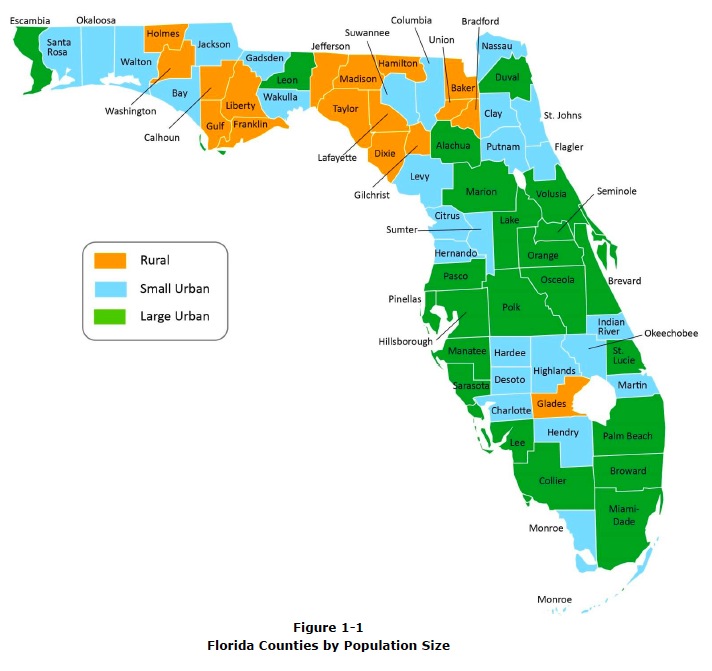NATIONAL CENTER FOR TRANSIT RESEARCH
Executive Summary
In 2012, Community Transportation Coordinators (CTCs) in Central and Southeast Florida suggested that the increased demand for travel to dialysis treatment had begun to negatively impact their ability to meet the transportation needs of other mobility-challenged residents of their communities.
In response to this observation, the Center for Urban Transportation Research (CUTR) at the University of South Florida (USF) undertook a multi-phased research project. This research captured qualitative and quantitative data which produced the following answers to the research questions.
- Research Question: How have the supply of and demand for dialysis transportation in Florida changed over the past 5 years?
Finding: Based on data from the CTCs that responded to the survey, total one-way dialysis trips increased during the five-year period from 282,000 in fiscal year 2008 to 426,000 in fiscal year 2012. As a percentage of total trips provided by the reporting CTCs, dialysis transportation trips increased from 11.9% in FY08 to 15.6% in FY12. - Research Question: How are the supply of and demand for dialysis transportation expected to change during the next five years?
Finding: Based upon the available data and the input of the CTCs surveyed and interviewed, it was not possible to answer this question. - Research Question: Which CTCs in Florida are expected to have the largest gap between demand for and supply of dialysis transportation service?
Finding: Based upon the available data and the input of the CTCs surveyed and interviewed, it was not possible to answer this question. - Research Question: How are dialysis trips impacting the operations and financial condition of CTCs?
Finding: 77 percent of CTCs that responded to the survey indicated they were able to accommodate all dialysis trip requests. Among the primary barriers for not being able to fulfill all of the dialysis trip requests, the primary factors provided were that the requested trips were outside the service span (i.e., hours of the day and days of the week). Insufficient funding and vehicle availability were the secondary contributing factors. - Research Question: How do the impacts of dialysis trips differ among rural-oriented CTCs, small urban-oriented CTCs, and large urban-oriented CTCs?
Finding: One-way dialysis trips represent a larger percentage of total one-way trips for urban CTCs. In fiscal year 2012, dialysis trips represented 9.4 percent of total trips for rural CTCs, 13.2 percent for small urban CTCs and 18.1 percent for large urban CTCs. The higher percentages in the urban areas are attributed to the ability of other trip demand to be met by the fixed route and complementary ADA paratransit services available in the urban areas. - Research Question: What unique transportation services are being implemented by CTCs to meet the increasing demand for funded dialysis trips?
Finding: There was one CTC serving a small urban area that has implemented a volunteer transportation service and a mileage reimbursement program to help satisfy demand for dialysis transportation. - Research Question: How are CTCs preparing for increased transportation demand associated with increased need for dialysis treatment?
Finding: The research did not uncover any specific future plans, but did document several “best practices” for the management of dialysis trips. These findings are summarized in Chapters 4 and 5.
About the National Center for Transit Research
www.nctr.usf.edu
The theme of NCTR is to make public transportation and alternative forms of transportation, including managed lanes, safe, effective, efficient, desirable, and secure. The goals of NCTR are: to minimize traffic congestion, maximize mobility options, promote safety and security, improve the environment, and enhance community sustainability. This will be accomplished by conducting applied and advanced research, energetically disseminating the results, and expanding the workforce of transportation professionals through education and training to address the challenges and opportunities of the future.
Tags: Community Transportation Coordinators, CTCs, Dialysis, FL, Florida, mobility, National Center for Transit Research







 RSS Feed
RSS Feed